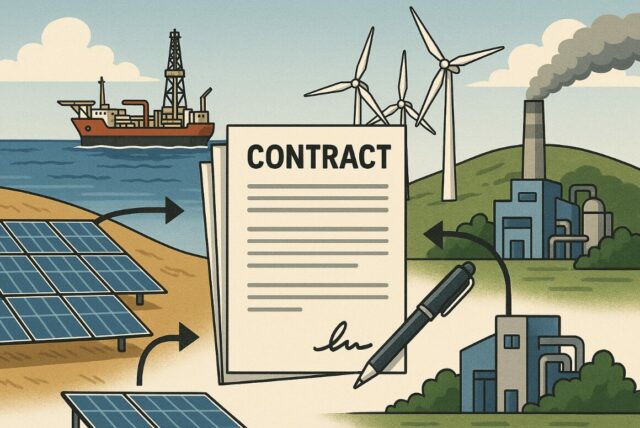Contract management is playing an increasingly important role within companies.
Identifying and understanding the different stages in a contract’s life cycle is an essential prerequisite for efficient management and optimization of a company’s contractual assets.
In this blog post, we’ll explore the six key stages of the contract lifecycle and explain the added value of the contract manager during these to help you optimize your contract management.
1. Contract initialization
Many people mistakenly regard drafting as the first stage in the life cycle of a contract.
To counter this popular belief, we often use the example of a newborn baby: before being born, the newborn baby must have been conceived, and before conception there must have been an encounter, a context, a reciprocal will.
The process is exactly the same for a contract. Before the design or drafting phase, there is a preliminary or pre-contract phase.
This is an essential stage, since it’s during this one that the views, opinions, objectives, expectations and potential deal-breakers of each stakeholder are exchanged.
Sometimes, a document such as an MoU, LoI or other pre-contract can be drawn up to formalize the intentions of the parties expressed during this initial phase.
Unfortunately, depending on the organization, contract managers are not always invited to take part in this pre-contract phase. One way of optimizing this process is to involve a contract manager in the pre-contract phase, which will make him much more relevant, efficient and profitable in the subsequent phases.

2. Drawing up the contract
Drafting a contract is the second essential stage in the life cycle of a contract. This phase, which is better known, is of course essential for several reasons:
– Formalize the expectations, rights and obligations of the parties.
– Precisely define the subject of the contract, whether products, services, deliverables, etc.
– Set the financial terms (price, payment, advances, etc.).
– Determine the conditions for guarantees, liability, insurance, etc.
– Agreeing rules for the devolution of intellectual property rights.
– Describe how pre-litigation and litigation, if any, will be handled by the parties.
– Etc.
While this stage naturally involves legal and commercial experts, the contract manager also brings real added value to this stage of the contract life cycle, thanks in particular to his or her expertise and know-how in the operational aspects of the contract.
By way of example, the contract manager will help to make operational and concrete penalty clauses, payment milestones, dispute resolution procedures and, more generally, any element likely to have an impact on the technical and financial management of the project, risk management and, more generally, the proper execution of the contract.

3. Contract negotiation
Logically, after the initialization and drafting of a first version of a contract, comes the negotiation phase, which represents the third essential stage in the life cycle of a contract. There’s no need to dwell on the importance of this phase, which is the subject of abundant literature (we’ll let you (re)discover our great article with reading tips).
During this phase, the potential contractors will discuss, adjust and – if all goes well – reach a final agreement on the terms and conditions of the contract.
Negotiation is a dynamic process (or art) that can often be complex, but it is also rich in opportunities for a business. contract manager to demonstrate added value in terms of writing and communication skills, as well as a holistic understanding of the contract, its ins and outs and its impact throughout its life cycle.
Alongside the legal expert, who ensures that the contract complies with legal and regulatory requirements, and the salesperson, who focuses on securing orders and preserving margins, the contract manager is the operational expert who ensures that the text is consistent with the reality of the project.

4. Contract approval and signature
Once the contract has been successfully negotiated, it moves on to the approval and signature phase.
During this stage, each party must follow internal approval procedures and milestones, which can vary in length and complexity – depending on company size and culture.
During this stage, it is important to ensure that all the necessary documents (financial, legal, compliance, etc.) are present and duly completed, and that everyone involved in the approval and signature chain understands simply and quickly what is involved.
Once again, the contract manager can play a key role in streamlining the contract approval and validation processThis can be done by drawing up a summary sheet that enables a decision-maker to understand – in just a few seconds – the risks and opportunities associated with the contract, or by presenting the contract to various approval committees.
Once the contract has been signed and approved, you still need to make sure that the other contracting parties have also signed it, and in some cases set conditions precedent for its entry into force (payment of a deposit, production of insurance certificates, setting up a committee, etc.).

5. Contract performance
This brings us to the stage at which it is most obvious to call on the services of a contract manager: the execution of the contract.
During this phase, the parties will organize themselves to fulfill their respective contractual obligations, requiring numerous actions on the part of the contract manager who will act – often in tandem with a project manager – as guarantor of proper execution and preservation of contract margins. These actions include
1. Performance management: by closely monitoring contract performance to ensure that all parties meet their contractual obligations. This means keeping a close eye on performance, deadlines, deliveries and any other relevant operational aspects.
2. Managing changes and amendments: during the life of a contract, changes may arise due to unforeseen circumstances or new requirements. The contract manager is responsible for managing these changes in a structured way, ensuring that they are documented, assessed for their impact on the contract, and formally agreed between the parties.
3. Conflict resolution: In the event of disagreement or dispute between the parties, the contract manager often intervenes first (or second after the project manager) to try to resolve the problems fairly. Their aim is to minimize disruption to contract performance and maintain a constructive working relationship between the parties.
4. Reporting and documentation: A fundamental aspect of contract performance is detailed reporting. The contract manager maintains accurate documentation of all contract-related activities, including communications, modifications, problems encountered and resolutions made. This documentation can be crucial in the event of litigation or the need for proof of compliance.
5. Performance monitoring: The contract manager closely monitors the performance of the contracting parties to ensure that they meet the standards and expectations specified in the contract. If deviations are identified, corrective measures can be put in place to bring performance back in line with the terms of the contract.
6. Payment management : Managing payments and invoices is an essential part of contract performance. The contract manager ensures that payments are made in accordance with the agreed terms and that invoices are accurate and in compliance with the contract.

6. Contract renewal or termination
As the expiry date approaches, the parties must decide whether to renew or terminate the contract. If the contract has been successful and both parties are satisfied, they may choose to renew it for an extended period. On the other hand, if the contract has failed to meet expectations or is no longer relevant, it may need to be terminated. It’s important to carefully evaluate contract performance and consider the best course of action.
This final stage in the contract life cycle consists of formally terminating the contract and ensuring that all obligations have been fulfilled. This includes activities such as balancing payments, carrying out post-contract evaluations and archiving relevant documents.
The contract manager is therefore one of the key players in contract offboarding, helping to analyze and document contract performance a posteriori, so that organizations can learn from it for future contracts.

Conclusion
We have identified and described the 6 main stages in a contract’s lifecycle in order to optimize its management (contract lifecycle management).
In our view, the presence of a contract manager optimizes contract management at each of these stages, thanks to their cross-disciplinary skills and expertise (legal, commercial, financial), coupled with interpersonal, communication and intercultural skills.
Understanding and optimizing the lifecycle of a contract is a strategic and ROI-producing activity for modern companies, since a direct link can be made between profitability and contract management.







